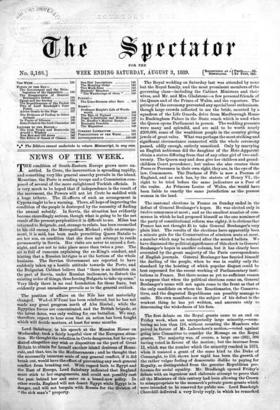The first debate on the Royal grants came to an
end on Friday week, when an unexpectedly large minority,—num- bering no less than 116, without counting the Members who paired in favour of Mr. Labonchere's motion,—voted against going into Committee to consider the Message on the Royal grants. The majority was, of course, a large one (282), 398 having voted in favour of the motion; but the increase from 13, which was the number which the minority reached in 1873, when it resisted a grant of the same kind to the Duke of Connaught, to 116, shows how rapid has been the growth of the rather vulgar feeling of democratic dislike to paying for Royalty, as distinguished from the genuine Republican pre- ference for social equality. Mr. Bradlangh opened Friday's debate with an ingenious and elaborate attempt to prove that all the Ministers of this century had been allowing the Crown to misappropriate to the monarch's private purse grants which were intended to be reserved for public use. Lord Randolph Churchill delivered a very lively reply, in which he remarked
that Mr. Bradlaugh must certainly have been studying a most mischievous book called " Every Man His Own Lawyer," forgetting that a man who is his own lawyer has a fool for a client. In 1837, a strong Committee, including Joseph Hume and George Grote, had studied the subject without so much as suggesting that the Crown had not a perfect right to the Civil List voted in lieu of the Crown lands and revenues which it had surrendered. Lord R. Churchill suggested that Mr. Bradlaugh should take forcible possession of one of the Royal palaces, and after being ejected, bring an action for assault, on the plea that the Royal palaces and all the revenues of the Crown had been obtained by the grossest fraud. Till he did some- thing of this kind, his remarkable discoveries would make no impression on the public mind.



































